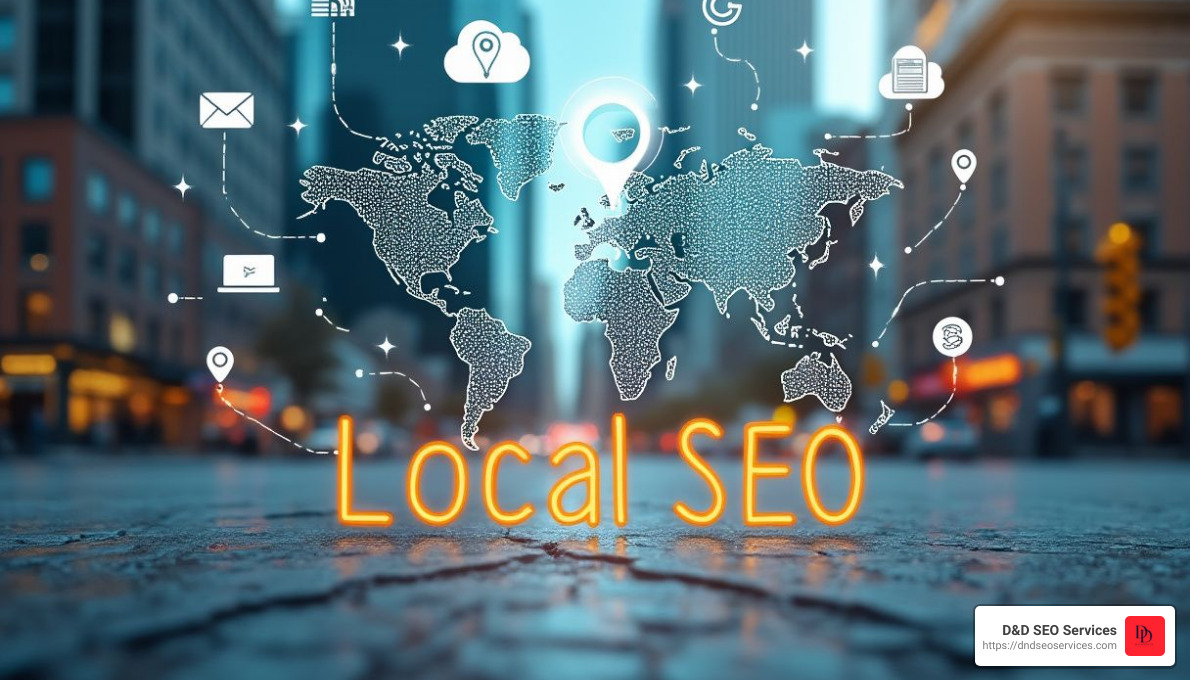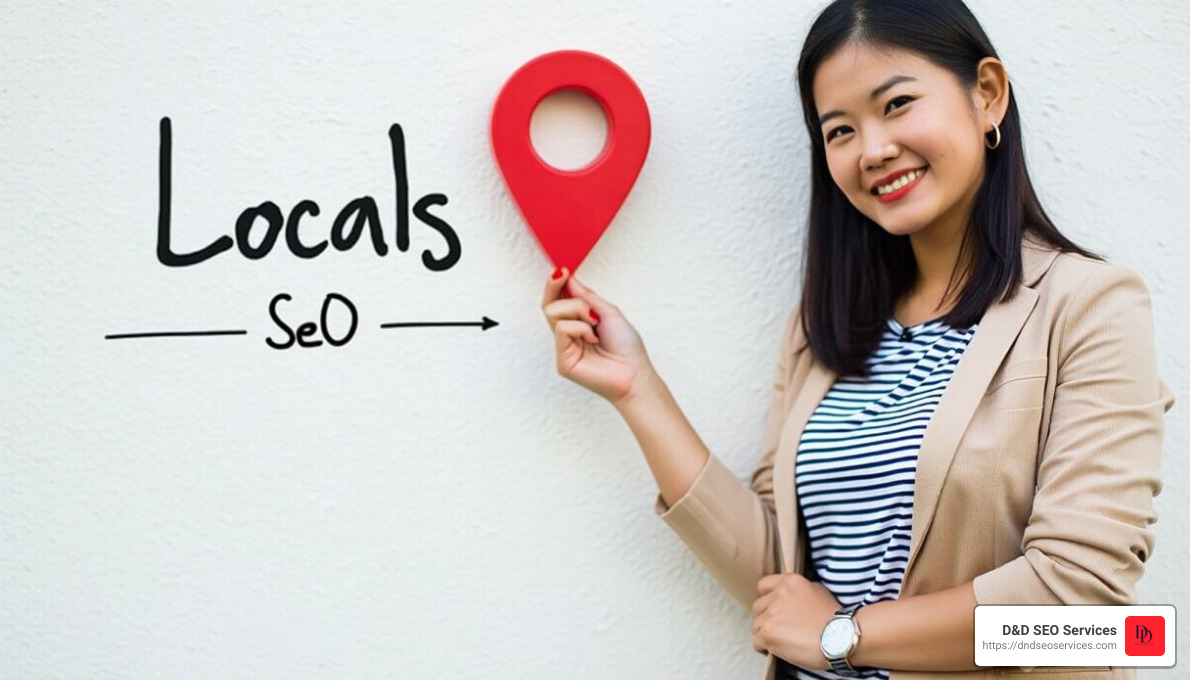The Power of Link Building for Local SEO
Link building for local SEO is one of the most effective ways to make sure your small business stands out in your local community. If you’re a small business owner struggling to attract nearby customers and boost your online visibility, you’re in the right place. Let’s dive right in to give you a quick glimpse of what this article will cover.
Why is local SEO important?
- Increased visibility: Helps potential customers in your area find you.
- More foot traffic: Brings customers directly to your doorstep.
- Enhanced reputation: Builds trust and credibility in your local community.
The role of link building in local SEO:
- Boosts search engine rankings: Quality backlinks are a key factor Google uses to rank websites.
- Targeted audience: Local links help you reach people who are more likely to visit your store or use your services.
- Builds relationships: Nurtures connections with local businesses, media, and organizations.
Overview of strategies:
1. Add Your Business to Local Directories
2. Reach Out to Local Media
3. Send a Press Release
4. Become a Trusted Source
5. Write Guest Articles
6. Contact Local Bloggers
7. Create a Local Guide
8. Sponsor Local Organizations
9. Offer a Scholarship
10. List Your Business on Alumni Pages
11. Become Active in Local Forums
12. Offer to Provide Testimonials
13. Host or Participate in Local Events
14. Utilize Social Media for Local Link Building
By the time you finish reading this article, you’ll have a solid understanding of how to use link building to boost your local SEO and drive more business through your doors.
What is Local Link Building?
Local link building is the process of acquiring backlinks from websites that share the same local audience as your business. These could be local publications, blogs, business sites, or directories.
Definition: Local Link Building
Local link building focuses on getting links from websites that are geographically close to your business. These links help signal to search engines that your business is relevant to people in your area.
Local Audience
The primary goal is to reach people who are most likely to use your services. For example, if you’re an accountant in a small east coast town, a link from a local publication is more valuable than one from a site with a national audience.
Relevance
Local links might come from websites with lower domain authority compared to national or international sites. However, their extreme relevance to your local audience makes them highly beneficial.
Benefits of Local Link Building
1. Better Audience Targeting
By getting links from local websites, your business becomes more visible to people who are more likely to buy from you. For example, a local food magazine featuring a story about your restaurant can drive more customers through your doors.
2. A Good Source of Backlinks
Local backlinks are often an untapped resource. Even small areas have numerous local blogs, business directories, and news outlets that you can target for links. Plus, smaller local websites are generally more open to linking to you compared to larger, more competitive websites.
3. Building Real Relationships
Local link building allows you to build genuine relationships with other local businesses. Instead of sending mass emails, you can make phone calls or even visit businesses in person. These relationships can lead to more than just backlinks; they can also result in partnerships and collaborations.
4. Importance for Local SEO
Google aims to show locally relevant results to searchers. This makes local SEO crucial for businesses that serve a specific geographic area. While we don’t know the exact algorithms Google uses, it’s likely that local backlinks play a role in determining local search results.
Visual Example
To illustrate, here’s a comparison of local search results for the term “Moving Company” in Las Vegas vs. Chicago:
Different websites rank for the same term based on the location of the searcher.
By focusing your link building efforts locally, you help search engines understand that your business is a key player in your area. This can boost your rankings for local search terms, driving more relevant traffic to your site.
Next up, we’ll dive into specific strategies you can use to build local backlinks.
14 Effective Local Link Building Strategies
1) Add Your Business to Local Directories
Local directories are a great starting point for link building for local SEO. Adding your business to directories like Yelp, Yellow Pages, and your local Chamber of Commerce can help improve your visibility.
Make sure your NAP (Name, Address, Phone number) is consistent across all listings. Inconsistent information can hurt your search rankings.
Pro Tip: Focus on industry-specific directories too. Tools like Whitespark or BrightLocal can help you find relevant citation sources.
2) Reach Out to Local Media
Local newspapers, magazines, and radio stations often have large audiences. Getting featured in these publications can give your business a significant boost.
For example, searching for a local newspaper in Manchester revealed a surprising number of publications. You might already know some, but it’s worth a Google search to find more.
Quick Tip: Don’t restrict yourself to newspapers. Magazines and industry publications often write stories about local businesses. Radio stations may also publish local news.
3) Send a Press Release
If you have a newsworthy event, send out a press release. Online publishers love to feature local businesses, especially if the story is interesting.
Instead of just introducing your business, mention unique concepts, charity work, or events. Tailor the story to the publication you are targeting.
Example: Fusion Accountants got featured in an article about factors limited companies should consider when choosing an accounting firm. They provided expert quotes, which added authority to the article.
4) Become a Trusted Source
Becoming a trusted source is another effective strategy. Provide quotes for stories in your area of expertise. This gives articles more authority and gets your business featured.
HARO (Help a Reporter Out) is a great platform for this. Building relationships with journalists can also help. Contact people in your network, or use social media platforms like Twitter to connect with journalists.
5) Write Guest Articles
Guest blogging on local publications is a powerful way to build links. Write articles for local blogs or news sites, focusing on topics relevant to your business and community.
Pro Tip: Consistency is key. Aim to contribute regularly to build sustained links. Always ask prospective publishers what specific content they are seeking.
6) Contact Local Bloggers
Local bloggers often have niche audiences that are highly engaged. Reach out to them for collaboration opportunities. They might be willing to feature your business or write a guest post.
Example: One business owner opened a local scholarship, got featured in their local paper, and even got a link from the Wall Street Journal.
7) Create a Local Guide
Creating a local guide can be a valuable linkable asset. For example, a guide to the best restaurants or events in your area. Share it with local publications and bloggers. If the guide is valuable, they’ll be happy to share it.
Pro Tip: If you’ve featured other businesses in your guide, let them know. They might add a link to your guide on their website.
8) Sponsor Local Organizations
Sponsoring local events or organizations is an excellent way to get backlinks. When you sponsor a group, event, or team with a website, they will often link back to your business.
Example: Agnes Marketing received a local link by sponsoring a Liverpool-based networking event.
9) Offer a Scholarship
Offering a scholarship can generate links from high-authority educational domains. Reach out to local schools and colleges to promote it on their scholarship pages.
Example: A law firm generated links from 49 referring domains to its scholarship page, attracting links from colleges with high domain ratings.
10) List Your Business on Alumni Pages
Universities often promote former students’ businesses on alumni pages. If you attended a university in the area, reach out to see if they will feature your company.
Example: NYU has a form alumni can use to suggest their local business, which can be a great way to get an educational backlink.
11) Become Active in Local Forums
Participating in local forums can build relationships and generate local links. Search for forums related to your area or local sports teams.
Pro Tip: While forum links aren’t particularly authoritative, they can still be an easy way to generate local links to your website.
12) Offer to Provide Testimonials
Offering testimonials for local businesses can lead to mutual benefits. When you provide a testimonial, the business may link back to your website.
Quick Tip: Reach out to businesses you’ve worked with and offer to write a testimonial for them.
13) Host or Participate in Local Events
Hosting or participating in local events can boost your local SEO. It helps with community engagement and can lead to local backlinks.
Example: A local business marketing firm got featured by sponsoring a networking event. This not only provided a link but also increased local visibility.
14) Utilize Social Media for Local Link Building
Social media platforms are powerful tools for local link building. Join local groups and engage with the community. Share local content and include your NAP info in your bios.
Pro Tip: Use social media to promote your local guides, events, and collaborations. This can drive traffic to your website and improve your local SEO.
By using these strategies, you can build high-quality local links and boost your rankings. Next, we’ll explore how to find local link building opportunities.
How to Find Local Link Building Opportunities
Finding local link building opportunities can significantly boost your local SEO efforts. Here’s how to do it effectively:
Competitor Analysis
Step 1: Identify Your Competitors
Start by identifying your local competitors. You probably already know some of them, but it’s a good idea to search for the terms you want to rank for on Google. Look at the top results and make a list of businesses that appear frequently.
Example: If you search for “Accountant London,” you’ll see several local accounting firms. These are your competitors.
Step 2: Analyze Their Backlinks
Once you have your list, analyze their backlink profiles. This will show you which websites are linking to your competitors.
Pro Tip: Look for local links. For instance, if a competitor has a link from a local business directory or a local news site, these are potential backlink opportunities for you too.
SEO Tools
SEO tools are essential for finding and analyzing backlinks. Here are some recommended tools:
- SEO Tool 1: Excellent for comprehensive backlink analysis.
- SEO Tool 2: Great for competitor research and finding backlink prospects.
- SEO Tool 3: Useful for tracking local citations and managing your local SEO.
How to Use These Tools:
- Enter Your Competitor’s URL: Use the site explorer feature to enter your competitor’s website.
- Check Backlinks: Navigate to the backlinks section to see all the sites linking to your competitor.
- Identify Opportunities: Look for local and relevant sites that you can also approach for backlinks.
Backlink Prospects
Finding Prospects:
- Local Directories: Ensure your business is listed on local directories like Yelp, Yellow Pages, and your local Chamber of Commerce.
- Local News Sites: Reach out to local newspapers and magazines. Offer to write a guest article or provide a quote for a story.
- Community Blogs: Find local bloggers who write about topics related to your business. Offer to collaborate or write a guest post.
Example: An accounting firm in London might find backlink opportunities from local business publications or community groups.
Approaching Prospects:
- Personalize Your Outreach: When reaching out to a website for a backlink, personalize your email. Mention how you found them and why your content would be a good fit.
- Offer Value: Explain how a backlink to your site will benefit their audience. This could be through valuable content, expert opinions, or exclusive offers.
- Follow Up: If you don’t get a response, don’t be afraid to follow up. Sometimes a gentle reminder is all it takes.
By leveraging competitor analysis and using SEO tools, you can uncover numerous local link building opportunities. This will help you build a strong backlink profile and improve your local search rankings.
Frequently Asked Questions about Link Building for Local SEO
Do backlinks help local SEO?
Yes, backlinks are crucial for local SEO. They act as endorsements from other websites, signaling to search engines that your business is trustworthy and relevant. According to a 2018 Local Search Ranking Factors survey by Moz, backlinks are one of the main ranking factors for local SEO.
When local publications, blogs, or community websites link to your site, it boosts your geographic relevance. This means search engines are more likely to show your business to users searching for services in your area.
What type of links should you care about for local SEO?
For local SEO, you should focus on two main types of links:
- Local Links: These come from websites based in your city, town, or region. Examples include local news outlets, community organizations, and local blogs. They are valuable because they show search engines that your business is relevant to the local community.
- Industry-Relevant Links: These come from websites related to your niche, even if they aren’t local. For example, an accountant in a small town could benefit from a link on a national accounting blog. These links boost your topical authority and help you rank higher in search results.
How do you build links for SEO?
Building links for SEO involves several tactics. Here are some effective strategies:
- Outreach to Local Publications: Contact local newspapers, magazines, and radio stations. Share newsworthy stories or events about your business. This can lead to media coverage and valuable backlinks.
- Guest Blogging: Write guest articles for local blogs and publications. This not only earns you backlinks but also establishes you as an expert in your field.
- Community Involvement: Sponsor local events or organizations. This often results in a backlink from their websites. It’s a win-win: you support your community and gain valuable SEO benefits.
- Create Linkable Assets: Develop content that local websites will want to link to. This could be a local guide, a useful resource, or an informative blog post.
- Use SEO Tools: Tools like The HOTH’s local citation checking service, Moz Local, and Whitespark can help you find and manage local backlinks. These tools identify backlink opportunities and monitor your progress.
- Leverage Competitor Analysis: Analyze the backlinks of your competitors using tools like Majestic. Identify potential linking partners and reach out to them.
By implementing these link building tactics, you can build a strong backlink profile that boosts your local SEO and helps your business rank higher in search results.
Next, we’ll delve into more advanced strategies to further enhance your local SEO efforts.
Conclusion
We explored the importance of local link building and provided 14 effective strategies to help you boost your local SEO rankings. Let’s summarize these strategies:
- Add Your Business to Local Directories: Ensure your business is listed in local directories with consistent NAP (Name, Address, Phone number) information.
- Reach Out to Local Media: Build relationships with local newspapers, magazines, and radio stations for potential backlinks.
- Send a Press Release: Share newsworthy events with local press to gain media coverage and links.
- Become a Trusted Source: Use platforms like HARO to provide expert quotes and attract links from journalists.
- Write Guest Articles: Contribute guest posts to local publications to showcase your expertise and gain backlinks.
- Contact Local Bloggers: Collaborate with local bloggers who have a relevant audience.
- Create a Local Guide: Develop valuable resources like local guides or directories to attract organic links.
- Sponsor Local Organizations: Engage in community sponsorships to build relationships and earn links.
- Offer a Scholarship: Create scholarships and get listed on educational sites.
- List Your Business on Alumni Pages: Take advantage of alumni networks to promote your business.
- Become Active in Local Forums: Participate in local community forums and add value to discussions.
- Offer to Provide Testimonials: Provide testimonials to local businesses in exchange for backlinks.
- Host or Participate in Local Events: Engage in local events to build connections and gain exposure.
- Utilize Social Media for Local Link Building: Leverage social media platforms to connect with local groups and communities.
Local SEO is crucial for businesses aiming to attract customers in their immediate area. By focusing on locally relevant links, you not only improve your search engine rankings but also connect with potential customers who are more likely to convert.
If you need help implementing these strategies or want to ensure your local SEO is optimized, D&D SEO Services can provide expert assistance. Our tailored strategies refine your online presence, ensuring visibility and engagement in your market.
A successful local SEO strategy is an ongoing process. Continuously analyze your results, adapt your approach, and keep building those valuable local links to stay ahead of the competition.








